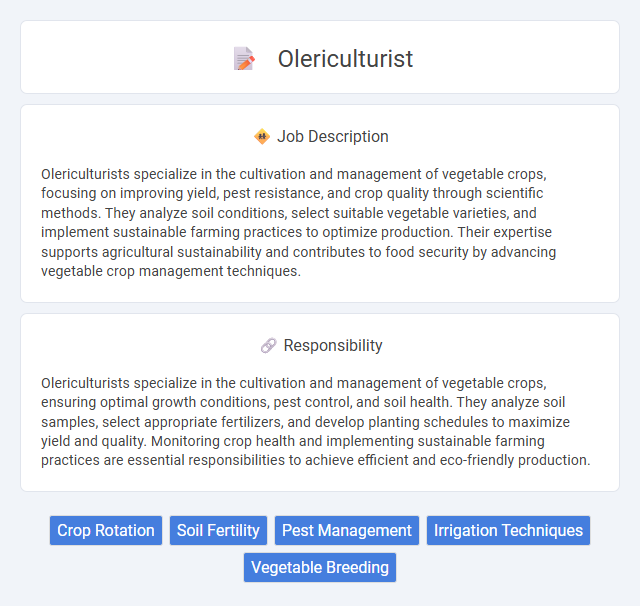
Olericulturists specialize in the cultivation and management of vegetable crops, focusing on improving yield, pest resistance, and crop quality through scientific methods. They analyze soil conditions, select suitable vegetable varieties, and implement sustainable farming practices to optimize production. Their expertise supports agricultural sustainability and contributes to food security by advancing vegetable crop management techniques.
Individuals who enjoy working outdoors and have an interest in plant cultivation might be well-suited for a career as an olericulturist. Those able to perform physical tasks and handle repetitive activities likely find this job fulfilling, as it involves the care and management of vegetable crops. People with patience and an analytical mindset could be more probable to succeed in addressing plant health and growth challenges in this role.
Qualification
Olericulturists typically require a bachelor's degree in horticulture, plant science, or agriculture, with specialized coursework in vegetable crop production. Practical experience through internships or fieldwork is essential for mastering pest management, soil fertility, and crop rotation techniques. Advanced careers may demand certifications or a master's degree focusing on sustainable vegetable cultivation and biotechnological methods.
Responsibility
Olericulturists specialize in the cultivation and management of vegetable crops, ensuring optimal growth conditions, pest control, and soil health. They analyze soil samples, select appropriate fertilizers, and develop planting schedules to maximize yield and quality. Monitoring crop health and implementing sustainable farming practices are essential responsibilities to achieve efficient and eco-friendly production.
Benefit
The role of an olericulturist likely offers significant benefits such as enhanced expertise in vegetable crop production and sustainable farming practices. This specialization may increase job security and open opportunities in agricultural research, education, and agribusiness sectors. Mastery in pest management and crop optimization techniques can potentially lead to higher yields and improved food quality, benefiting both producers and consumers.
Challenge
Olericulturist roles may present challenges related to managing crop diseases and pests that can significantly impact vegetable yield and quality. Adapting to unpredictable weather patterns and evolving market demands might require continuous learning and innovation. The probability of encountering labor shortages or supply chain disruptions could further complicate crop production schedules.
Career Advancement
Olericulturists specializing in vegetable crop production can advance their careers by gaining expertise in crop management technologies, pest control strategies, and sustainable farming practices. Pursuing certifications in agricultural sciences or agronomy, coupled with experience in research or farm management, enhances opportunities for senior roles in agricultural consultancy, research institutions, and commercial farming operations. Continuous learning in genetic crop improvement and precision agriculture also positions olericulturists for leadership roles and innovation-driven projects within the agricultural sector.
Key Terms
Crop Rotation
Olericulturists specialize in the cultivation of vegetable crops, emphasizing sustainable practices such as crop rotation to maintain soil fertility and reduce pest infestations. Implementing systematic crop rotation helps optimize nutrient use efficiency and improves overall yield quality in vegetable farming systems. Mastery of these techniques enables olericulturists to enhance long-term soil health while maximizing production profitability.
Soil Fertility
Olericulturists play a crucial role in enhancing soil fertility by applying knowledge of nutrient cycles and soil amendments to optimize vegetable crop growth. They analyze soil composition and recommend organic or inorganic fertilizers to maintain balanced nutrient levels essential for high-yield production. Their expertise ensures sustainable soil management practices that promote long-term soil health and plant productivity.
Pest Management
Olericulturists specialize in the cultivation of vegetables, with a critical focus on pest management to ensure healthy crop production. They implement integrated pest management (IPM) techniques, combining biological controls, chemical pesticides, and cultural practices to minimize pest damage while promoting sustainable farming. Expertise in identifying pest species, monitoring infestation levels, and applying targeted treatments is essential for maximizing vegetable yield and quality.
Irrigation Techniques
Olericulturists specializing in irrigation techniques optimize water delivery systems to enhance vegetable crop growth and yield. They implement drip irrigation, sprinkler systems, and soil moisture monitoring to ensure efficient water usage while preventing over-irrigation and reducing water waste. Mastery in scheduling irrigation cycles based on crop type, soil condition, and climate factors is essential for sustainable olericulture practices.
Vegetable Breeding
Olericulturists specializing in vegetable breeding focus on developing new vegetable varieties with enhanced traits such as disease resistance, improved yield, and better nutritional content. They utilize genetic selection, hybridization, and biotechnology techniques to create cultivars suited for specific climates and market demands. Their work supports agricultural sustainability and food security by introducing resilient and high-quality vegetable crops.
 kuljobs.com
kuljobs.com